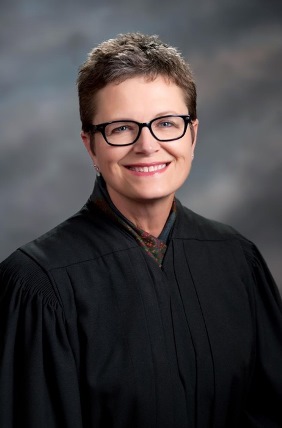
Kansas Supreme Court Justice Carol A. Beier has announced her retirement, effective Sept. 18.
Justice Beier served on the Supreme Court since September 2003. She earlier served on the Kansas Court of Appeals for more than three years. She made her announcement early Friday morning.
“I will be ever grateful for the opportunities I have been given to spend so much of my legal career in service to my home state and its citizens,” Beier said. “Twenty years and thousands of cases since my children helped me put on my robe for the first time, I will pack it away with pride. This is possible because I can bear personal witness to the good faith and daily striving of our Kansas courts to be and remain fair and impartial guardians of the rule of law and the rights of all.”
Beier was appointed to the Supreme Court by former Gov. Kathleen Sebelius and to the Court of Appeals by former Gov. Bill Graves.
Before taking the bench, she was a partner at Foulston and Siefkin law firm in Wichita and taught at the University of Kansas School of Law. She spent her first few years after law school in a private white collar criminal defense practice in Washington, D.C.; as a staff attorney at the National Women’s Law Center; and as a clerk for former federal Court of Appeals Judge James K. Logan.
Justice Beier, a native of Kansas City, Kansas, received the Distinguished Alumni Award from the KU Law School. She has a journalism and law degree from KU. Beier graduated in 1976 from Bishop Ward High School.
She is the first female graduate of the KU School of Law to serve on the high court. She was named to the KU Women’s Hall of Fame in 2012.
The voters of Kansas retained Justice Beier four times – in 2002, 2004, 2010, and 2016.
Chief Justice Marla Luckert, who has served on the Supreme Court with Beier since 2003, said Beier leaves an outstanding legacy as an appellate jurist with a steadfast dedication to the rule of law who wrote her opinions with the reader in mind.
“Her writing is always clear and easily understood, eloquent, usually accented by a memorable and clever phrase, and reflects principled reasoning,” Luckert said. “Attorneys will recall her piercing questions, quick wit, sharp intellect, and fairness and impartiality. Court employees will speak highly of her leadership, commitment to transparency, and concern for them. Most memorable is her dedication to the rule of law. She set aside her personal opinions to embrace the rule of law knowing some of her decisions would be unpopular. She will be greatly missed, and we wish her and her family well.”
Merit-based selection process
Supreme Court vacancies are filled using a merit-based nomination process that Kansans voted to add to the Kansas Constitution in 1958.
When there is a vacancy on the bench, the Supreme Court Nominating Commission reviews applications and conducts public interviews of nominees. The commission narrows the nominee pool to three names that it sends to the governor. The governor chooses one nominee to appoint.
Eligibility requirements
To be eligible, a nominee must be:
• at least 30 years old;
• a lawyer admitted to practice in Kansas and engaged in the practice of law for at least 10 years, whether as a lawyer, judge, or full-time teacher at an accredited law school.
Supreme Court Nominating Commission
The Supreme Court Nominating Commission has nine members. There is one lawyer and one nonlawyer from each of the state’s four congressional districts, plus one lawyer who serves as chairperson. Nonlawyers are appointed by the governor. Lawyers are elected by other lawyers within their congressional districts. The chairperson is elected by lawyers statewide.
Selection criteria
When the Supreme Court Nominating Commission reviews nominees for justice, they look at the person’s:
• legal and judicial experience
• educational background
• character and ethics
• temperament
• service to the community
• impartiality
• respect of colleagues
Judicial conduct
Justices must follow the law and not be influenced by politics, special interest groups, public opinion, or their own personal beliefs. Justices demonstrate their accountability by following a Code of Judicial Conduct that establishes standards of ethical behavior. They also take an oath of office that includes swearing to support, protect, and defend the U.S. Constitution and Kansas Constitution.
Retention elections
After a new justice serves one year on the court, he or she must stand for a retention vote in the next general election to remain in the position. If retained, the justice serves a six-year term.
